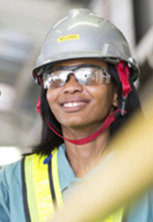Corporate South Africa has a role to play in fighting abuse against women and children
13 November, 2013
Empirical evidence shows that preventing violence against women and children is good for the economy. It is therefore in the interest of businesses to join in efforts to fight this scourge. While numerous companies have become much better at dealing with other social issues, there still remains a challenge in implementing mechanisms that seek to combat violence against women and children.
Empirical evidence shows that preventing violence against women and children is good for the economy. It is therefore in the interest of businesses to join in efforts to fight this scourge. While numerous companies have become much better at dealing with other social issues, there still remains a challenge in implementing mechanisms that seek to combat violence against women and children. Khanyisile Kweyama, executive director of Anglo American South Africa, elaborates on how the fight against women and children abuse is not only for the government.
Too many of our fellow South Africans live with the truth of domestic violence with very little recourse and no headlines about their fate. In 2012, the World Health Organisation reported that 60,000 South African women and children were victims of domestic violence on a monthly basis, considered to be the highest rate in the world.
Across the planet more than 600 million women live in societies where gender violence is not even considered a crime. In South Africa, we have a constitution and legislation that advocates for gender equality and protection from abuse. Unfortunately, we also live in a society that sometimes does not live up to these principles.
A recent study by the Medical Research Council revealed that the majority of South African men and women believe that a woman should always be subservient to her partner. In a society where subservience is expected, it is saddening to note that, as the same research revealed, 20,1% of men and 15,6% of women believe that sometimes a rape victim was “asking for it”.
According to research, one out of every four women in South Africa is in an abusive relationship, every six days a woman is murdered by her intimate partner and every 25 seconds a woman or girl is raped in our country. These alarming statistics are an indication of the long way we have yet to go before the equality encapsulated in our constitution is lived by our people.
Industry has a role to play in tackling this social issue. We have the economic capacity and influence to help change the society around us. It makes good business sense to support projects that provide the most vulnerable with the necessary tools to further their personal development.
Economic modelling predictions suggest that violence against women declines as her alternatives outside the relationship improve. In a business sense, this means empowering a woman through employment which affords them the stability to leave their abuser. If only for this reason, industry has a duty to encourage female participation in the economy.
Creating opportunity is just one step to ending the scourge of domestic violence. Industry can, and must, contribute resources toward this struggle, but it will take a co-ordinated effort with government to create an environment conducive to change. Government needs to bring the full weight of the legal system to bear, in order to enforce the laws we already have, while industry can help fund safe havens for abused women and their children.
Through the Chairman’s Fund, Anglo American supports non-governmental organisations offering shelter to women brave enough to walk away from an abusive relationship. Havens such as the privately run Bethany Home in Johannesburg offer them and their children a safe place to rebuild their lives. Further, in partnership with government, Anglo American, through its Thermal Coal business, has also been assisting the flagship Ikhaya Lethemba home.
At Ikhaya Lethemba we have helped provide equipment for the home’s residences and medical ward. These interventions, however, come to nothing if government and business does not continue to support them with stronger legal arbitration, including establishing specialised investigative units and courts.
For Anglo American, interceding to end the cycle of abuse is equal to fighting for the human rights of fellow South Africans. There is an empowerment slogan that we should remember – Strike a Woman and You Strike a Rock. Women are the rock of our society, and not offering the most vulnerable of them assistance to integrate back into communities tears at the foundations of our country.




